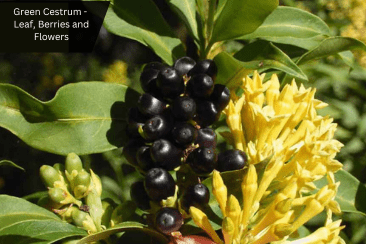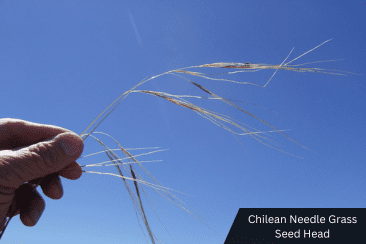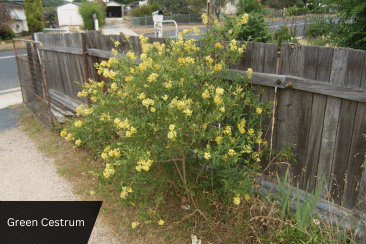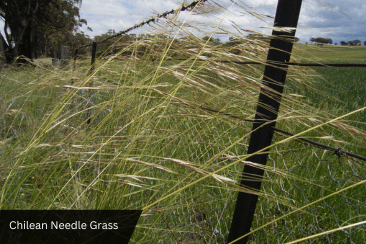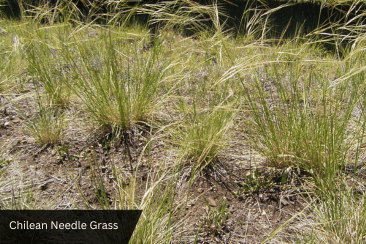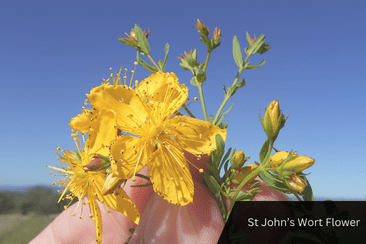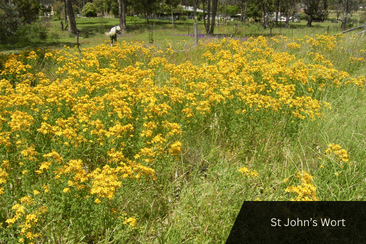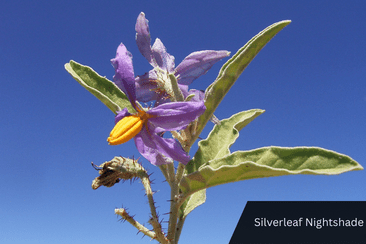Biosecurity – Weeds
The Biosecurity Act 2015 came into effect on 1 July, 2017, and it repealed the Noxious Weed Act 1993. The new Act aims to prevent, eliminate and minimise biosecurity risks posed by weeds.
Weed Management is a major issue for all land managers. Weeds threaten our valuable agricultural industries, influence the economic viability of our communities, affect human health, and pose a major threat to Australia’s unique biodiversity. Weeds cost Australia over $4 billion per year in lost production and control measures. In NSW alone, weeds cause an estimated $600 million in losses every year.
Biosecurity Matter
All landholders and government agencies have a legal obligation to control biosecurity matter (formerly noxious weeds) on their land and have an effective control strategy that ensures that they meet their duty under the Act. Please refer to the Northern Tablelands Regional Strategic Weed Management Plan for the weeds list.
General Biosecurity Duty (GBD)
Any person or a carrier who deals with biosecurity matter and who knows, or ought reasonable to know, the biosecurity risk posed or likely to be posed by the biosecurity risk posed or likely to be posed by the biosecurity matter, carrier or dealing has a biosecurity duty to ensure that, so far as is reasonably practicable, the biosecurity risk is prevented, eliminated or minimised.
If Inverell Shire Council’s Authorised Officers believe that a land owner/occupier is failing in their biosecurity duty to control weeds on their land, they can issue a Biosecurity Direction to prevent, eliminate or minimise the biosecurity risk. Failure to comply with the biosecurity direction is an offence and could result in a penalty notice or prosecution.
To see the regional prioritised weeds list and outcomes to demonstrate compliance with the general biosecurity duty, please review the following documents and links.
Weed Watch
Plants to look for this spring:
GREEN CESTRUM
A native of Chile and Peru – Very toxic! Like many of our priority weeds, green cestrum (Cestrum parqui) was introduced into Australia as a garden plant. It’s an easy to grow plant, and the attractive, yellow flowers have guaranteed widespread plantings in gardens everywhere.
IDENTIFICATION
Green cestrum leaves are dark green, smooth and shiny. The distinctive flowers are yellow and trumpet-shaped, about 20mm long. The ripe, black berries are very popular with birds, and many of seeds end up being dropped in shady areas near waterways. The new plants flourish in these well-watered areas, and the cycle continues at an ever-increasing rate.
Cestrum grows to a height of around 3 to 4 metres. Apart from the bright-yellow flowers and the plentiful black berries, there are two other important ID procedures:
- The stems/branches are very brittle – they snap off easily and;
- Crush a leaf between your fingers – The smell is very unpleasant. Ensure you wash your hands afterwards!
EFFECT ON ANIMALS
Green cestrum can be TOXIC to animals including sheep, horses, pigs, poultry but ESPECIALLY CATTLE! According to “Noxious Plants of Australia” by Parsons & Cuthbertson (Inkata Press) it doesn’t take much plant material to affect animals, “which become feverish with poor appetites and increased thirst, are excited and sometimes scour before developing a general paralysis. Death usually occurs within hours of the first signs of symptoms so animals are often found dead without any symptoms being seen. Post-mortem examination shows general haemorrhaging throughout the body tissues, a large amount of blood in the bowel and severe gastroenteritis.”
NEVER take green cestrum for granted. The main danger period for animals is when they are new to the paddock, or when they are exposed to plants that have been broken off or chemically treated. A shower of rain after a prolonged dry period is another “trigger” when cattle decide to start eating green cestrum – with deadly results.
LEGAL STATUS:
Green cestrum is a Regional Priority Weed, with it’s Management Category being CONTAINMENT in the Northern Tablelands Regional Strategic Weed Management Plan 2023 – 2027.
CHILEAN NEEDLE GRASS
Chilean needle grass (Nassella neesiana) is regarded by many as one of the worst weeds in Australia because of its invasiveness, potential for spread, and its economic and environmental impacts.
Chilean needle grass, named for its sharp, pointed seeds, is a perennial, tussocky grass now common in southern areas of Inverell Shire. It is very hardy, and drought-tolerant. Its capability to produce such large numbers of seeds ensures it will survive herbicides, grazing, slashing and fires. The seeds are spread by wind, animals, floodwaters, vehicles and machinery. Chilean needle grass can produce 20,000 seeds per square metre!
EFFECT ON ANIMALS
Stock, especially sheep, should not be exposed to mature Chilean needle grass. The seeds attach to animals, many actually penetrating the skin. Apart from the obvious injury and discomfort to the animals, the sharp seeds cause skins and hides to be subsequently downgraded. The sharp seeds also cause problems for working dogs.
IDENTIFICATION
Chilean needle grass is a perennial tussock-forming grass up to 1.5m high. Seed heads emerge spring to late summer and, when mature, have a distinctive purplish colour. It’s hard to identify until it comes into seed.Chilean needle grass remains well camouflaged amongst other grasses for most of the year, until flowering and seeding commences in the spring. At this stage the lighter colour of the plant sets it apart from most other grasses. The characteristic angle of the seed head is a definite identification feature (see photo). Chilean needle grass is similar in appearance to other native spear grasses. Landholders really do need to see an actual Chilean needle grass plant to ensure they can identify it if it appears on their own property.
LEGAL STATUS
Chilean needle grass is a Species of Concern in the Northern Tablelands Regional Strategic Weed Management Plan 2023 – 2027.
St John’s Wort
One of the district’s most problematic weeds, St John’s wort (Hypericum perforatum) threatens all grazing properties in northern New South Wales. One plant of St John’s wort can produce 30,000 seeds. The (sticky) seeds are spread by animals, and the seeds can remain viable in the ground for up to thirty years. If one plant can be allowed to set seed, that property is going to be infested for many years!
EFFECT ON ANIMALS
Over-exposure to St John’s wort can cause various animal health problems, including photosensitization, leading to skin infections (particularly on faces and white body markings), nervous disorders etc. In extreme cases the plant cause animal deaths. Some humans can also develop allergic reactions to St John’s wort.
IDENTIFICATION
Apart from the distinctive flowers, one positive way to identify St John’s wort is by close examination of the leaves. Hold a leaf up to the light and (if your eyes are good enough) you’ll see what look like tiny pin holes through every leaf. These are the hypericum oil glands.
LEGAL STATUS
St John’s wort is a Species of Concern in the Northern Tablelands Regional Strategic Weed Management Plan 2023 – 2027.
Silverleaf Nightshade
Silverleaf nightshade can be found in many parts of Inverell Shire. It is a very difficult plant to deal with. Once established, it’s virtually impossible to eradicate because the plant’s root system can penetrate to a depth of 2-4 metres. Chemical control is generally ineffective on established plants because the chemicals don’t work their way through the roots.
Many weeds can be controlled by ploughing, but this is certainly not the case with silverleaf nightshade. Ploughing actually adds to the problem because the broken root parts grow into new plants.
The only control for established areas is by preventing plants from producing seed. And, because the seeds can remain viable in the ground for 15 years, eradication is a long term project!
EFFECT ON ANIMALS
All parts of the plant, particularly the green or ripe fruit, can be toxic to animals. Symptoms include bloating, trembling, loose faeces, nasal discharge, salivation and breathing difficulties. Cattle are more susceptible than sheep. Goats or horses don’t seem to be affected.
IDENTIFICATION
Silverleaf nightshade (Solanum elaeagnifolium) grows to a height of around 80 centimetres. The flowers are purple (sometimes white) with yellow stamens – the plant is usually (but not always) armed with small, sharp prickles [as in the photograph]. The round fruit (berries) change in colour as they mature, from green stripes to motley yellow and orange. Each fruit contains about 60 seeds. The fruit is spread by floodwaters, machinery, animals and birds. Sheep can carry the seed in their digestive tract for periods of 7 days or more without affecting the germination capability of the seed.
To further confuse the identification issue, silverleaf nightshade has three common “look-alikes”: Native Quena, Narawa Burr and Apple of Sodom.
LEGAL STATUS
Silverleaf Nightshade is a Regional Priority Weed, with its Management Category being CONTAINMENT in the Northern Tablelands Regional Strategic Weed Management Plan 2023 – 2027.
For more information, refer to WEEDWISE or contact Council’s Biosecurity Officer, Geoff Riley, on 02) 6728 8284 or 0427 241 806.
Last modified: 12-Oct-2023




